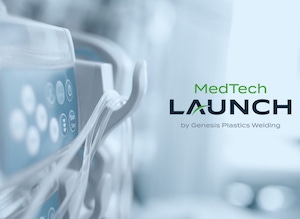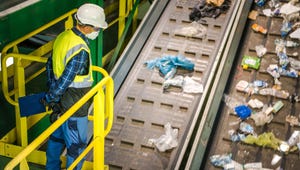A laser-like focus on quality management systems paves way for the successful commercialization of a medical product, according to MedTech Launch, an initiative of Genesis Plastics Welding (Fortville, IN).
June 15, 2018

Nathan Glass, Vice President of Product Development at Genesis Plastics Welding (Fortville, IN) cares about quality management systems . . . a lot. That’s very good news for inventors and engineers who have an idea for a medical device, and may have even had some design and development work done, but need help converting that concept into a manufacturable medical product that will get the thumb’s up from FDA.
|
Nathan Glass, Vice President of Product Development, Genesis Plastics Welding. |
Genesis Plastics Welding introduced MedTech Launch last month, a division of the company that is focused on assisting medical device clients in navigating the product launch process from initial concept to commercialization. At the co-located PLASTEC East and Medical Design and Manufacturing (MD&M) East event in New York, NY, this week, I sat down with Glass, who leads the new program, and CEO Tom Ryder to learn more about this business and, specifically, what it brings to the table in what is a fairly crowded field of medtech contract manufacturers.
Certified to ISO 13485, Genesis has been a valued link in the medical manufacturing supply chain for many years, but the company noticed a gap between what some companies needed and what it was able to provide. “Some of our existing customers required a bit more help developing their product that went beyond RF welding,” said Glass, “while some folks, who were not our clients, came to us with what they thought was a medical device ready to go into production. Often, it wasn’t,” said Glass. In some cases, Genesis Plastics Welding was not able to help them directly. MedTech Launch changes that dynamic: “We can help customers make a device that is optimized for manufacturability, either at Genesis Plastics Welding or elsewhere, and that has the quality system and documentation required for FDA clearance,” explained Glass.
Glass cites one project currently in development that is an early-stage Class III implantable device, which won’t be manufactured by Genesis. His lips otherwise are sealed about this project, except to say that it is “something that hasn’t been done before.” There are many other cases, however, where product development and manufacturing go hand in hand under the Genesis Plastics Welding umbrella, adding value that exceeds the sum of its parts.
|
When someone comes to MedTech Launch with a viable project, the company will build a robust quality management system (QMS), produce the appropriate drawings and specifications, develop the risk management protocols and design verification, and then hand all of this off to Genesis. Because it’s done correctly from the start, Genesis won’t have to come back to the customer and say, “our QMS requires this” or “you might have a QMS, but you’re really missing a lot of stuff here,” said Glass. That emphasis on quality systems at the very beginning is important, he stressed. “Inventors aren't always aware of the extent of planning, validation and verification activities that are required to get a device into production,” said Glass.
Keeping the whole process under one roof leverages the power of momentum, added Glass. Stops and starts, which may occur when a project is transitioned from one supplier to another, create their own obstacles, said Glass. “Smooth transitions are important to clients and financial backers.”
Yes, you can hire someone to sketch out a design or draft the documentation, added company CEO Ryder, but you’re missing something substantial if there isn’t a connection with the manufacturing piece of the puzzle. “We can do the design and development and then help the customer find another supplier to manufacture the product because it’s outside of our wheelhouse, for example, or we can keep it in house. Either way, what’s important is that we are doing the design and development work based on the manufacturing requirements for a medical product,” stressed Ryder.
“Taking an idea from a piece of paper and designing a product is a very important skill set,” acknowledged Glass. “But it is not sufficient to get the required clearances.” MedTech Launch wants to build that bridge.
About the Author(s)
You May Also Like






